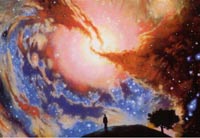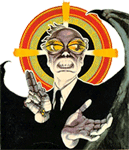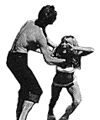Top 5 books that shift your reality
Saturday, November 26, 2005 → by Danieru
Inspired in part by all lists everywhere here are the top 5 books that shifted my perspective on the world, on reality, on the self:
 Star Maker - Olaf Stapledon
Star Maker - Olaf Stapledon
Spanning over billions of years of cosmological evolution and delving Godlike into the very heart of existence, Star Maker reads like a spiritual rollercoaster ride through all the beautiful realities fiction has to offer. And yet 70 years after its publication this science fiction masterpiece remains largely forgotten.- Brave New World - Aldous Huxley
A utopia consumed in happiness, intimate with pleasure yet devoid of the conflicts that make us truly human. The 'savage' protagonist John is symbolic of everything their society lacks; a tragedy they will never recognise. - Hyperspace - Michio Kaku
Take Hawking's 'Brief History of Time'. Add a wealth of personality, a dash of futurism and heaps and heaps of imagination. Kaku's genius illustrates relativity theory, space-time and the extra dimensions of the universe with childlike wonder. Everything you 'know' about reality will fall away like a cocoon from the cosmic butterfly. - Strawdogs - John Gray
In this concise and mesmerizing book Gray not only manages to dissolve your faith in humanity, but to rebuild it anew from fresh, yet primeval perspectives. Gray deconstructs humanism and in doing so offers the reader a chance to see themselves for what they really are - a beast of evolution; a bundle of self organising cells; a single entity trapped in the web of the natural order.... True liberation...  The Three Stigmata of Palmer Eldritch - Philip K Dick
The Three Stigmata of Palmer Eldritch - Philip K Dick
Dick was bound to come up, blessed as he was with the ability to peer through the cracks in the doors of perception. Palmer Eldritch is all - God; Fear; The Great Unknown. He is the creator and destroyer of innumerable worlds. Through him we find the truth, through his greatest illusions we glimpse a reflection of ourselves - trapped in infinity with absolute terror as our only companion.
And oh so many more I missed... Hitchhiker's Guide to the Galaxy, 1984, Simulacra and Simulation, Naked Lunch, Flatland....
What books shifted your perspective and why?
Categories: Books, Reviews, Lists, Reality, Meme, Consciousness, Sci-fi, Science, Literature
|
|

 Links
Links Subscribe via RSS!
Subscribe via RSS!


 Via Email
Via Email


November 23, 2005 12:14 PM
The Unbearable Lightness of Being (Milan Kundera: everything I ever wanted in a novel: philosophy, arrogance, politics, love, history, honesty, and varied perspectives)
The God of Small Things (Arundhati Roy: Brings together post-colonial politics, class issues, religion, brutal truth, and innocence)
Infections and Inequalities (Paul Farmer: Discusses his work in Haiti trying to bring first world medical care to a third world scenario, sheds some light on the AIDS epidemic and our cultural/political perspectives of disease in general)
A Small Place (Jamaica Kinkaid: One of the first books I read in college, explains basically how and why tourism works mainly to tear at the dignity of Natives everywhere, one of the first things that really got me thinking about whiteness and priviledge on a large scale)
The Autobiography of Malcolm X (as told by Alex Haley: Not that I'm big on idolism, but looking with depth into the life of a man as controvercial as him has had me quoting this thing since high school)
November 24, 2005 12:48 AM
2. Kim Stanley Robinson's The Mars Trilogy, which makes utopianism accessible to a huge readership to a whole planetary scale.
3. Dean Koontz's Intensity, which showed me how televisual writing could still have literary depth.
5. Charles Stross' Accelerando, which was the Neuromancer of the dotcom bubble-singularity.
November 25, 2005 2:12 AM
On the Road.
Tropic of Cancer.
Sophie's Choice.
Fathers and Sons.
November 25, 2005 7:25 AM
I haven't read the majority of those. I have been meaning to get my hands on the god of small things for a while, as well as Dean Kootz's work, many people have recommended them too me.
After failing to read On the Road (I got a third of the way in and enjoyed exactly none of it) and outright despising Art of Motorcycle Nonsense (how can you be absorbed by a writer when you actively loathe his character? It's the one book I can honestly say I wish I'd never bothered with) I have kind of given up on that whole 'post-hippie, road trip across the soul' literature. Burroughs on the other hand was beatnik before it had a beat, he was and still is the beat master. May his words disassemble reality as long as there are words to be broken.
I forgot too to mention Jorge Luis Borge - the master of Magical Realism. Look here for more on him...
Keep em coming!
November 25, 2005 8:08 AM
November 25, 2005 6:25 PM
The following books made me think a lot, and left some unanswered questions:
Primo Levi's "If this is a man", is it possible to survive the Holocaust keeping your humanity in the process? what makes us human?
Kurt Vonnegut's Mother Night, is a hidden truth more important than a public lie?
Antonio Damasio's The feeling of what happens-what is conscience? what is emotion?
Augustine of Hippo's Confessions of a Sinner
Besides 1984, Orwell also wrote some very fine essays, specially "Politics and the English language"
November 26, 2005 1:36 PM
As for five good kicks to my junk (I am probably forgetting many):—
Astral Dynamics, Robert Bruce
Thundersqueak, Ramsey Dukes
Watchmen, Alan Moore
The Outsider, Colin Wilson
Prometheus Rising, Robert Anton Wilson
I also wanna get my hands on the whole of the Great Ideas series put out by Penguin. I adore Penguin.
November 30, 2005 6:30 PM
I recently picked up the penguin edition of Nietzsche's Why I am so Wise. Great stuff, if a little difficult to penetrate at first. Thing is, I think you can probably get most of the books listed in the series for free, as many are WELL out of copyright.
I haven't checked, but I bet Project Gutenberg has the majority of them on file...
December 01, 2005 5:05 AM
December 05, 2005 7:02 PM
2. Siddharta
3. Short History of Everything
4. The Dharma Bums
5. Cryptonomicon
January 31, 2006 6:00 PM
2. Diaspora, Greg Egan.
3. The Singularity is Near, ray Kurzweil
4. Inferno, August Strindberg
5. Mind Tools, Rudy Rucker.
February 13, 2006 4:12 PM
February 23, 2006 7:49 AM
1. "Everything You Know Is Wrong" by Lloyd Pye
2. "The Politics of Evolution" by Neil Freer
3. "The Twelth Planet" by Zacharia Sitchin (who provided the research and content for the first two titles, but read Lloyd Pye first; he provides an easier path to the absolutely incredible but inescapable conclusion that Sitchin gives us.)
4. "Keepers of the Garden" by Dolores Cannon
5. "Gods, Genes and Consciousness" by Paul von Ward
6. "The Gathering" by William Gammill
7. "Summoned" by Dana Redfield
Zacharia Sitchin is the main source of information for the almost shocking content of the first two titles, but he is somewhat reader-unfriendly, so that's why I suggest reading him last. I'm not even going to dare to say what his central thesis is. But I was compelled to recognise something so utterly unbelievable yet so resonant with truth. Freer and Pye show in different ways just how true is that central thesis. Dolores Cannon uses hypnotherapy to take subjects not merely into past lives, but past extraterrestrial lives, and there is absolutely no mistaking the veracity of her content. Dana Redfield likewise is utterly convincing in her descriptions of her own experiences. William Gammill's book is a little jewel of enlightenment, a real find, and which points at universal truths that would resonate with anybody operating on that higher frequency. Is it fact? Is it fiction? What amazing experiences did he have (or not have)? Just read it, it is quite extraordinary, but then, all of the others are just that. If you really want to "break open the head" (as Daniel Pinchbeck titled his very interesting book, but let's not go there right now) then have a look at the first three on my list. If you can assimilate the information given there, I can assure you that the world will never again be the same. It's scary, but the truth is not always comforting.
March 23, 2006 10:18 PM
2. Flatland by A. Abbott
3. World of Null-A by A.E. van Vogt
4. Voyage to Arcturus by David Lindsany
5. Everlasting Man by G.K. Chesterton
You might raise an eyebrow at this list, since it contains four sf books and one work of Christian apologetics, but, let me justify:
In terms of sheer scope and inventiveness, Stabledon is still unmatched, even by more modern writers: a universe and all eternity was too small to contain his imagination.
Flatland is a short and sweet meditation on the fourth dimension, and a fable on the folly of intellectual certainty.
Null-A was a semenal book for me, not in the least because it was the first of the 'paranoid thriller' type, later reworked by Philip K Dick, where the hero is not sure who he is. Beneath its pop-psychology gimmick, the book actually touches on some profound ideas about the nature of reality and identity.
Arcturus is a 'paranoid thriller' set in an unearthly spiritual universe, the giant planet Tormance, where two deceptive gods try to cheat the Prometheus of that world out of the divine fire he is carrying back to mankind. A strange, strange book, but one which has more new ideas, and wilder, than any other I've read. I have puzzled over what two new primary colors might look like, or a third positive sex, or five new sense impressions.
I almost chose Chesterton's 'Man Who Was Thursday' as another 'paranoid thriller', this one set in a Christian mythology, against a background of a spy struggle vs the Supreme Anarchist Council. But it is a little predictable, and the end reminds me too much of that English humor for oddness we see in Avengers or The Prisoner.
I am picking 'Everlasting Man' because it is like one of these amnesia thrillers written by Van Vogt, except that here it is autobiographical, and the main character, Chesterton himself, sets out to arrive at the most heroic and wild and rebellious philosophy he can, and then finds himself in the posture of the most conservative of Western thought, the Catholic Church, and he lets out a gust of immense, world-shattering laughter. For those of you who mistrust or even hate Christianity, reading this book might show you the romance, as wild as anything on Arcturus, of what seems a trite religion. I list it here not necessarily because I agree with Chesterton, but because this book was also the first place I came across anyone who doubted the commonplace assumptions of modernity.
September 01, 2006 4:20 PM
September 26, 2006 2:11 PM
Primo Levi
Gli Indifferenti (1929)
Alberto Moravia
Im Westen nichts Neues (1929)
Erich Maria Remarque
Also sprach Zarathustra (1885)
Friedrich Nietsche
'Autobiography' (ca. 1571)
Benvenuto Cellini
The first five that I could come up with (some might find it hard to travel back to 16th century Europe). Find your various translations yourself 'plz' - all worth the trouble.
December 01, 2006 8:00 PM
November 08, 2007 5:51 PM
i'm just gonna mention authors
p.k. dick
frank herbert
stanislaw lem
yevgeny zimyatin(?)
the dude who wrote chung kuo( david white---------?)
robert j sawyer
just off the top of my altered head
February 18, 2010 2:21 AM
Post a Comment